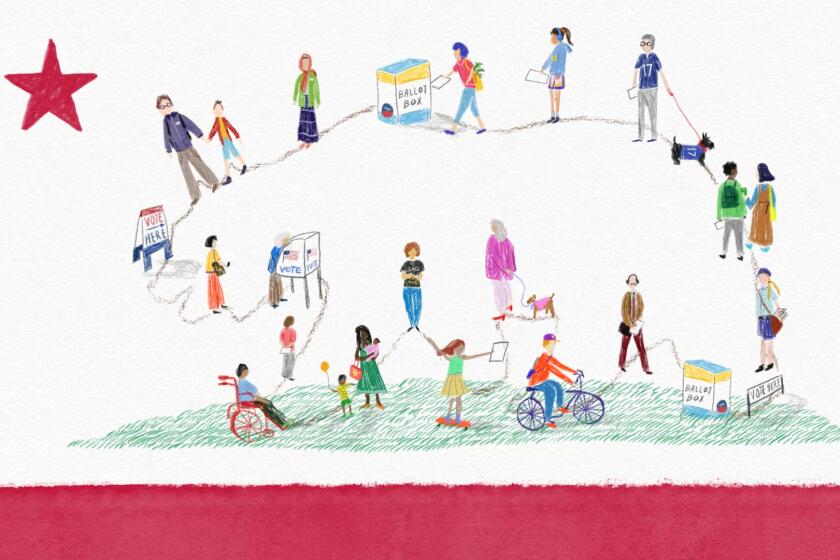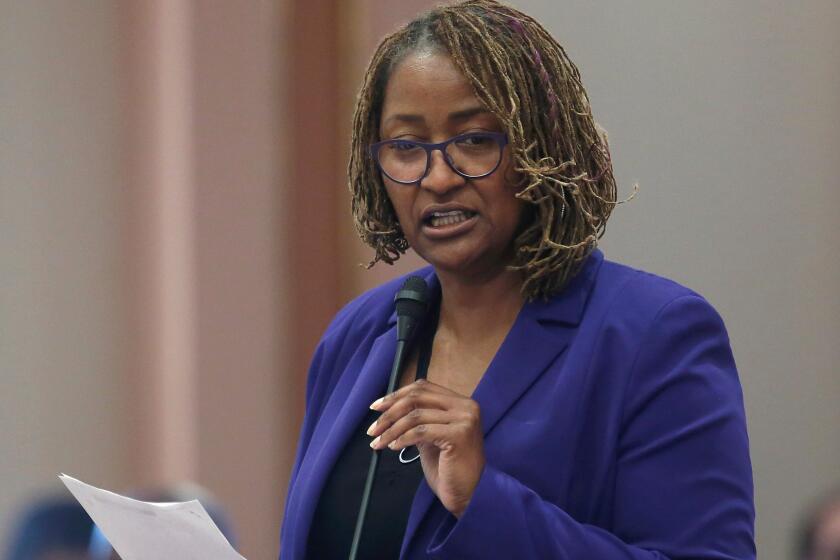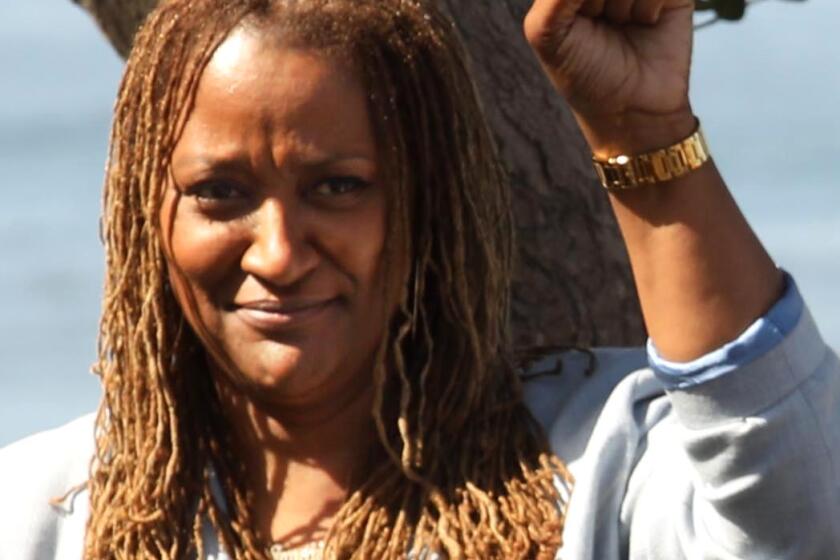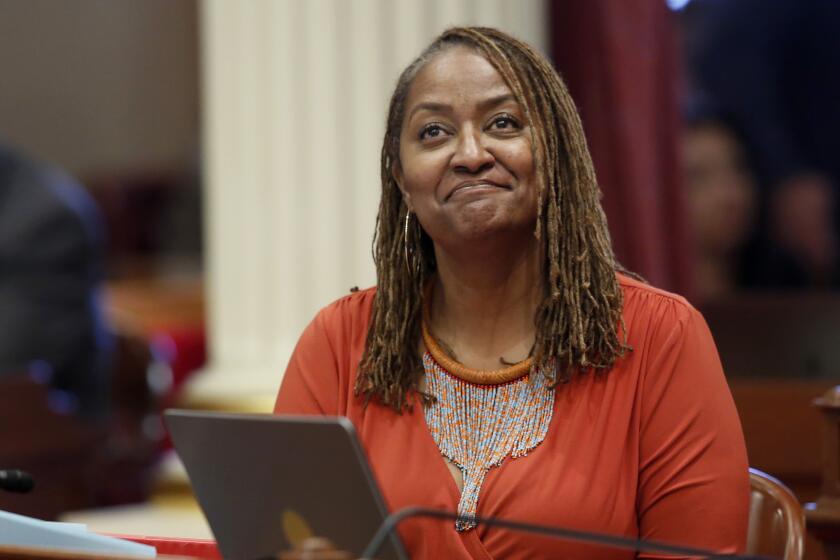Endorsement: Holly Mitchell for a second term on the L.A. County Board of Supervisors
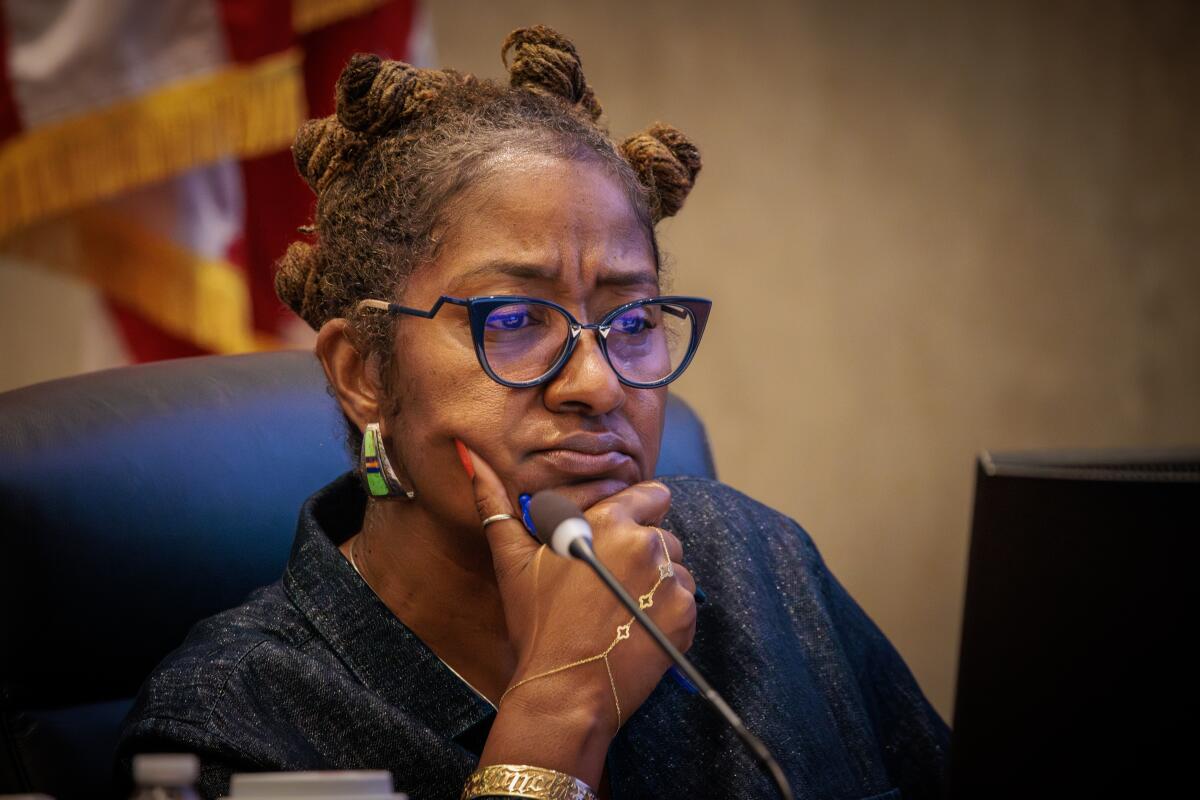
Holly Mitchell was elected to the Los Angeles County Board of Supervisors toward the close of tumultuous 2020, the year of COVID lockdowns, the George Floyd murder, street protests, a surge in violent crime and a general uptick in anxiety. As she took office, Americans’ confidence in government and law enforcement was plunging, and things only became worse with the sacking of the U.S. Capitol. It was a particularly difficult time to become part of the leadership of the nation’s most populous county.
Mitchell rose to the challenge. In a low-profile job that is often poorly understood and difficult to perform in a county of any size, and virtually impossible in one of more than than 10 million people, she quickly got up to speed. She and her four colleagues steered a path out of the COVID emergency and into recovery with thoughtful spending of federal emergency aid to keep the most at-risk county residents housed and fed, and small landlords and businesses afloat, despite the disruption to the economy.
While the presidential contest will garner the most attention in 2024, there are many important races and measures on state and local ballots.
The county faces many unmet challenges. It has yet to turn the corner on homelessness, mental health care, addiction, poverty, inequity, child welfare — all of the seemingly intractable problems that other levels of government shunt to counties.
But beyond expressing dissatisfaction with the status quo, Mitchell’s three challengers in the March primary offer little practical vision for the way forward, and even less evidence of know-how and ability to succeed. Entrepreneur Daphne Bradford calls for better support for police. Homeless services provider Katrina Williams wants more permanent supportive housing. Former homeless services provider Clint Carlton, who currently runs an organization safeguarding people online, calls for a greater sense of urgency in dealing with homelessness. These are diagnoses of the county’s problems rather than solutions.
The Times recommends Mitchell for another term.
The people of the L.A. County’s 2nd District need Holly Mitchell’s vision of and commitment to better justice, better health and smarter development.
Mitchell represents the 2nd District, which includes affluent Culver City, Marina del Rey and South Bay cities, plus historically Black and immigrant communities in Inglewood, Compton, Carson and much of South Los Angeles.
The district also includes numerous unincorporated communities, to which Mitchell directs essential city-type services such as sanitation and libraries. That’s the most straightforward and immediately appreciated, if not the easiest, part of the task.
More thorny is the job of fixing the social and economic problems that result in unequal access to justice, education, employment, healthcare and recreation. On these issues, Mitchell is in many ways the board’s conscience, insisting that equity is not merely a nice add-on to county responsibilities such as managing beaches and art museums, but the essence of the job, because inequity feeds the poverty and despair that create the county’s biggest problems.
No matter how you slice it up, five people cannot adequately represent the more than 10 million people of Los Angeles County.
There may be no better example of this than the board’s discussion in September of a new court protocol that eliminates money bail for many people arrested in lower-level crimes. The other supervisors, all of whom express some progressive views on policy matters, were lukewarm on the program because of a baseless worry that releasing people without bail pending arraignment might increase crime.
Mitchell took a different tack, correctly noting that we endanger ourselves and undermine equal justice if we falsely assume that people with enough money to bail out of jail will act responsibly, and that people who are released without paying won’t.
The Los Angeles Board of Supervisors quickly and quietly rejected a chance to discuss improvements in governance and effectiveness. Bring it up again.
Last year, Mitchell became the inaugural chair of the Los Angeles County Affordable Housing Solutions Agency, an intergovernmental organization intended to fight homelessness by increasing the stock of below-market-rate homes. LACAHSA aims to get the county and its many cities to work together and may prove to be a good vehicle for Mitchell, who is impatient working strictly within the brittle lines of L.A. County government. But LACAHSA illustrates county government’s structural shortcomings — it was created by state legislation at the urging of L.A. activists, not the Board of Supervisors. It is difficult to pinpoint a major county problem that has been solved by the county government itself, without intervention by court order, state legislation or some other outside power.
Mitchell has made a point of examining the ineffective way the county is governed. Imagine the state of Michigan (which has about the same population as the county) being run without a governor and only a five-person legislature, and you get an idea of how inadequate the Board of Supervisors is for managing Los Angeles County. Mitchell called for studies of more effective structures and procedures, and she should continue pushing for governance reform in her second term.
Voters should appreciate Mitchell’s focus on the big questions, such as the structure of county government and equity in the delivery of county services. But as Mitchell frequently notes, delivery of essential services can’t wait and her constituents should keep up the pressure for more homeless housing, better mental health care and safer streets. Mitchell has done well in striking the balance and is the right choice for the next four years.
More to Read
A cure for the common opinion
Get thought-provoking perspectives with our weekly newsletter.
You may occasionally receive promotional content from the Los Angeles Times.
